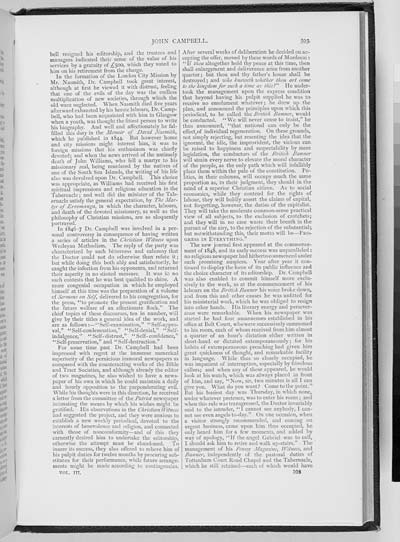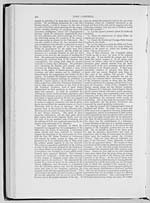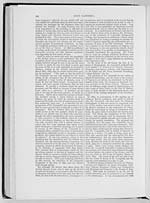Volume 3 > Half-Volume 6
(239) Page 593
Download files
Individual page:
Thumbnail gallery: Grid view | List view

593 bell resigned his editorship, and the trustees and managers indicated their sense of the value of his services by a gratuity of �500, which they voted to him on his retirement from the charge. In the formation of the London City Mission by Mr. Nasmith, Dr. Campbell took great interest, although at first he viewed it with distrust, feeling that one of the evils of the day was the endless multiplication of new societies, through which the old were neglected. When Nasmith died five years afterward exhausted by his heroic labours, Dr. Camp- bell, who had been acquainted with him in Glasgow when a youth, was thought the fittest person to write his biography. And well and affectionately he ful- filled this duty in the Memoir of David Nasmith, which he published in 1844. But however home and city missions might interest him, it was to foreign missions that his enthusiasm was chiefly devoted; and when the news arrived of the untimely death of John Williams, who fell a martyr to his missionary zeal, being murdered by the natives of one of the South Sea Islands, the writing of his life also was devolved upon Dr. Campbell. This choice was appropriate, as Williams had received his first spiritual impressions and religious education in the Tabernacle; and well did the minister of the Tab- ernacle satisfy the general expectation, by The Mar- tyr of Erromanga, in which the character, labours, and death of the devoted missionary, as well as the philosophy of Christian missions, are so eloquently portrayed. In 1846-7 Dr. Campbell was involved in a per- sonal controversy in consequence of having written a series of articles in the Christian Witness upon Wesleyan Methodism. The reply of the party was characterized by such bitterness and calumny that the Doctor could not do otherwise than refute it; but while doing this both ably and satisfactorily, he caught the infection from his opponents, and returned their asperity in no stinted measure. It was in no such contests that he was best qualified to shine. A more congenial occupation in which he employed himself at this time was the preparation of a volume of Sermons on Self, delivered to his congregation, for the press, "to promote the present gratification and the future welfare of an affectionate flock." The chief topics of these discourses, ten in number, will give by their titles a general idea of the work, and are as follows :�'' Self-examination," " Self-appro- val," "Self-condemnation," "Self-denial," "Self- indulgence," "Self-distrust," "Self-confidence," "Self-preservation," and "Self-destruction." For some time past Dr. Campbell had been impressed with regret at the immense numerical superiority of the pernicious immoral newspapers as compared with the counteracting works of the Bible and Tract Societies, and although already the editor of two magazines, he also wished to have a news- paper of his own in which he could maintain a daily and hourly opposition to the preponderating evil. While his thoughts were in this direction, he received a letter from the committee of the Patriot newspaper intimating the means by which his wishes might be gratified. His observations in the Christian Witness had suggested the project, and they were anxious to establish a new weekly periodical, devoted to the interests of benevolence and religion, and connected with those of noncomformity�and of this they earnestly desired him to undertake the editorship, otherwise the attempt must be abandoned. To insure its success, they also offered to relieve him of his pulpit duties for twelve months by procuring sub- stitutes for their performance, while future arrange- ments might be made according to contingencies. VOL. III. After several weeks of deliberation he decided on ac- cepting the offer, moved by these words of Mordecai: "If thou altogether hold thy peace at this time, then shall enlargement and deliverance arise from another quarter; but thou and thy father's house shall be destroyed; and who knoweth whether thou art come to the kingdom for such a time as this?" He under- took the management upon the express condition that beyond having his pulpit supplied he was to receive no emolument whatever; he drew up the plan, and announced the principles upon which this periodical, to be called the British Banner, would be conducted. "We will never cease to insist," he thus announced, "that national can only be the effect of individual regeneration. On these grounds, not simply rejecting, but resenting the idea that the ignorant, the idle, the improvident, the vicious can be raised to happiness and respectability by mere legislation, the conductors of the British Banner will strain every nerve to elevate the moral character of the people, as the only path which will infallibly place them within the pale of the constitution. Po- litics, in their columns, will occupy much the same proportion as, in their judgment, they should in the mind of a superior Christian citizen. As to social economics, while they contend for the rights of labour, they will boldly assert the claims of capital, not forgetting, however, the duties of the capitalist. They will take the moderate common-sense practical view of all subjects, to the exclusion of crotchets; and they will in no case waste their breath in the pursuit of the airy, to the rejection of the substantial; but notwithstanding this, their motto will be�PRO- GRESS IN EVERYTHING." The new journal first appeared at the commence- ment of 1848, and its early success was unparalleled r no religious newspaper had hitherto commenced under such promising auspices. Year after year it con- tinued to display the force of its public influence and the choice character of its editorship. Dr. Campbell was also enabled to commit himself more exclu- sively to the work, as at the commencement of his labours on the British Banner his voice broke down, and from this and other causes he was unfitted for his ministerial work, which he was obliged to resign into other hands. His literary energy and persever- ance were remarkable. When his newspaper was started he had four amanuenses established in his office at Bolt Court, who were successively summoned to his room, each of whom received from him almost a quarter of an hour's dictation either written in short-hand or dictated extemporaneously; for his habits of extemporaneous preaching had given him great quickness of thought, and remarkable facility in language. While thus so closely occupied, he was impatient of interruption, especially by frivolous callers; and when any of these appeared, he would look at his watch, which was always placed in front of him, and say, "Now, sir, two minutes is all I can give you. What do you want? Come to the point." But his busiest day was Thursday, in which none, under whatever pretence, was to enter his room; and when this rule was transgressed, the Doctor invariably said to the intruder, "I cannot see anybody, I can- not see even angels to-day." On one occasion, when a visitor strongly recommended, and coming on urgent business, came upon him thus occupied, he only heard him for a few moments, and added by way of apology, "If the angel Gabriel was to call, I should ask him to retire and walk up-stairs." The management of his Penny Magazine, Witness, and Banner, independently of the pastoral duties of Tottenham Court Road Chapel and the Tabernacle, which he still retained�each of which would have 108
Set display mode to:
![]() Universal Viewer |
Universal Viewer | ![]() Mirador |
Large image | Transcription
Mirador |
Large image | Transcription
Images and transcriptions on this page, including medium image downloads, may be used under the Creative Commons Attribution 4.0 International Licence unless otherwise stated. ![]()
| Biographical dictionary of eminent Scotsmen > Volume 3 > Half-Volume 6 > (239) Page 593 |
|---|
| Permanent URL | https://digital.nls.uk/74514752 |
|---|---|
| Attribution and copyright: |
|
| Description | Volume III. Contains names alphabetically from Macadam to Young. |
|---|

